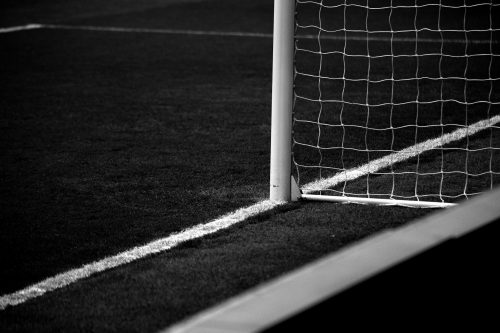I’ve lived the last 100 days with no goals, and I’ve never felt happier or more alive.
When I met my friend Leo Babauta—two-thousand miles from my home in Dayton, Ohio—he said there were three things that significantly changed his life: establishing habits he enjoyed, simplifying his life, and living with no goals.
I was already living the first two: I had established my pleasurable habits, and I had simplified my life. But it was difficult for me to grasp the whole “no goals” thing. The thought of living a life with no goals sounded insane to me: it was counterintuitive, it was scary, and it went against nearly everything I had learned about productivity.
In my corporate life of yesteryear, I managed hundreds of people for a large corporation—an organization in which I was often considered the productivity guy, the goal guy: I met deadlines, overproduced, exceeded expectations, got results. That’s why they paid me the big bucks.
I regularly had umpteen goals in various stages of completion: short-term goals, long-term goals, personal goals, business goals, health goals, financial goals, vacation goals, consumer-purchasing goals, you name it. I thought if I crossed enough goals off my to-do list, I’d eventually be content. So I worked harder and harder, focusing on every new goal with lapidary precision.
But I was stressed out of my mind with all those goals. My hauntingly perpetual to-do list was just that—perpetual, never-ending. And it was ever-growing. Plus, I was continuously disappointed when I didn’t achieve a goal, or when I missed a deadline. I was even disappointed when I attained a goal, but didn’t overachieve. It was a self- consuming high: it was never enough.
I needed a way to quit my goals cold turkey, so I did two things after speaking with Leo…
First, I asked myself, “Why do I have these goals?” I had goals so I could tell if I was “accomplishing” what I was “supposed” to accomplish. If I met a goal, I was allowed to be happy—right? Then I thought: Wait a minute—why must I achieve a specific result towards an arbitrary goal to be happy? Why don’t I just allow myself to be happy now?
Second, I decided to live with no goals for a while. I didn’t know how long, because I didn’t make it a goal. I figured I’d give it a shot for a month or so, maybe longer, to see what happened. If it affected me negatively, I could return to my rigid life of “achieving” and “producing results” with my color-coded spreadsheets containing scads of goals.
What happened? Breaking free from goals changed my entire outlook on life.
Three Ways Living with No Goals Changed My Life
1. I am less stressed. I have virtually no stress now. Sure, there are brief moments in which I feel vexed or bothered, but I feel so much less stress these days. People I’ve known for years comment on how calm I am. With no goals, they say I’m a different person—a better person.
2. I am more productive. I didn’t anticipate this one. I thought getting rid of goals meant I was going to sacrifice results and productivity, but the opposite has been true. I tossed productivity and became more productive. I’ve written the best literary fiction of my life, I’ve watched our website’s readership increase significantly, I’ve met remarkable new people, and I’ve been able to contribute to other people like never before. The last 100 days have been the most productive days of my life.
3. I am happier and more content. During my 30 years on this earth, I’ve never been this consistently happy or content. It is an incredible feeling—even surreal at times. With the decreased stress and increased productivity resulting from no goals, I am able to enjoy my life—I am able to live in the moment. And thus I am appreciably happier and more content.
Three Misconceptions About No Goals
Three arguments against the no-goal lifestyle presented themselves to me in the last 100 days, all three of which I’d like to address.
1. Complacency: Doesn’t a life with no goals make you complacent? Well, if by “complacent” you mean “content”—then yes. Otherwise—no, it didn’t make me complacent. In fact, the opposite was true: after removing the stress from my life, I engaged in new, exciting endeavors while living a passionate, meaningful life.
2. Growth: Doesn’t a life with no goals prevent you from growing? No—I’ve grown considerably in the last 100 days. I’ve gotten into the best shape of my life, strengthened my personal relationships, established new relationships, and written more than ever before. I’ve grown more in the last 100 days than any other 100-day period in my life.
3. You still have goals: You say you have no goals, but don’t you still have some goals, like finishing your new novel or “being happy” or “living in the moment”? It’s important to make a distinction here: yes, I want to “be happy” and “live in the moment” and “live a healthy life,” but these are choices, not goals. I choose to be happy. I choose to live in the moment. I choose to live a healthy life. I don’t need to measure these events, I simply live this way. As for my new novel, I intend to finish writing it—I’ve never worked harder on anything in my life—but I’m enjoying the process of writing it, and if I never finish, that’s okay, too. I’m not stressed about it anymore.
Living with no goals has changed me for the better: It has added layers of happiness and contentment I didn’t realize were possible. It has allowed me to contribute to other people in meaningful ways.
I’m not going back to a goal-oriented life. No goals. None at all. Life is outstanding without them.
This essay was originally published at Zen Habits.

